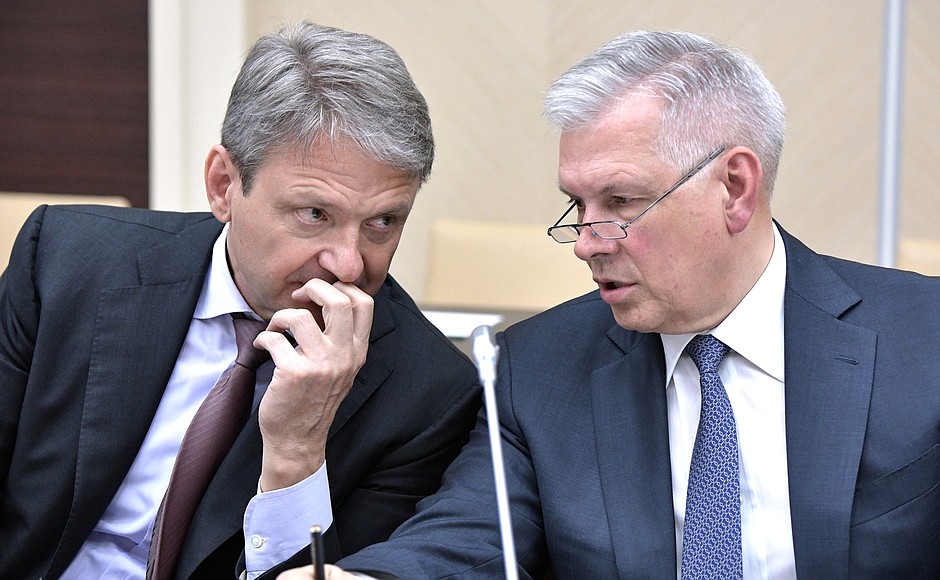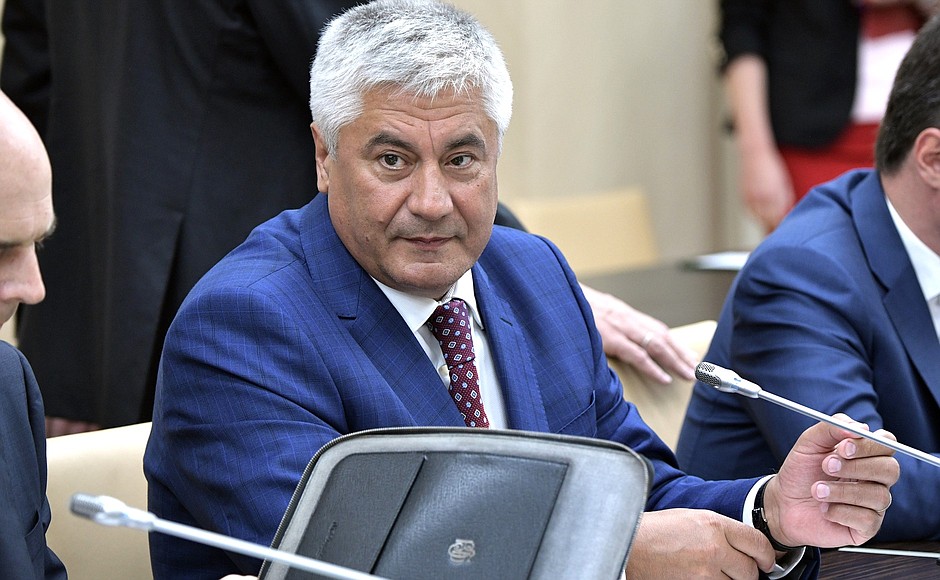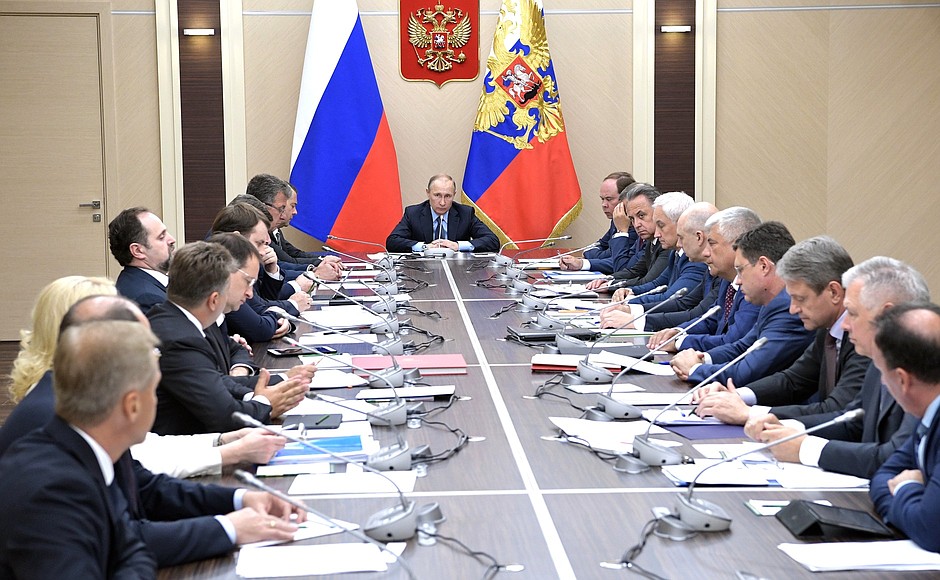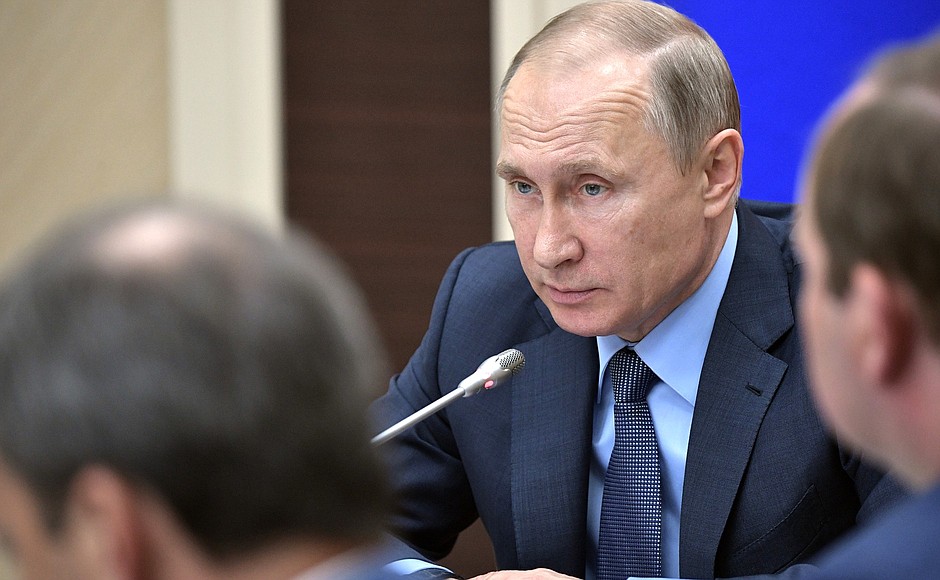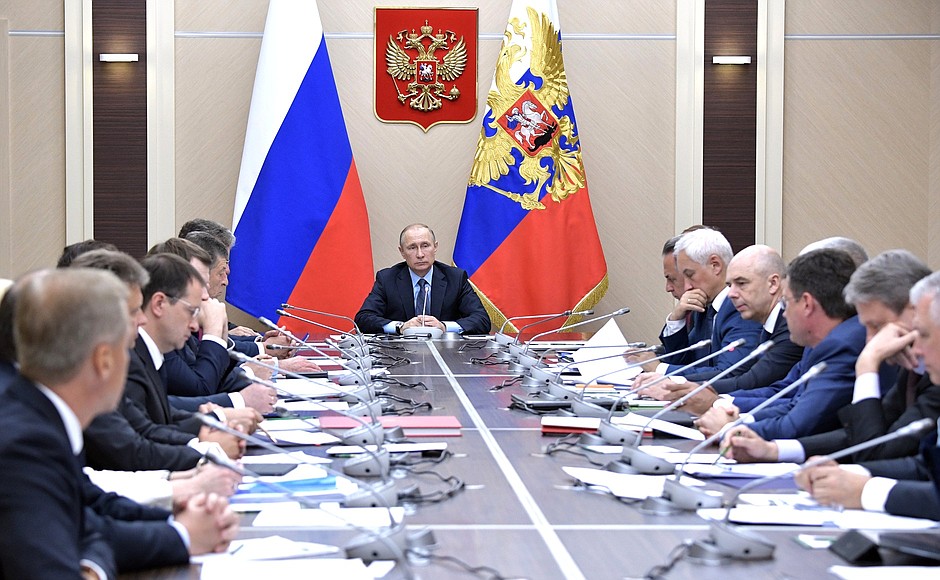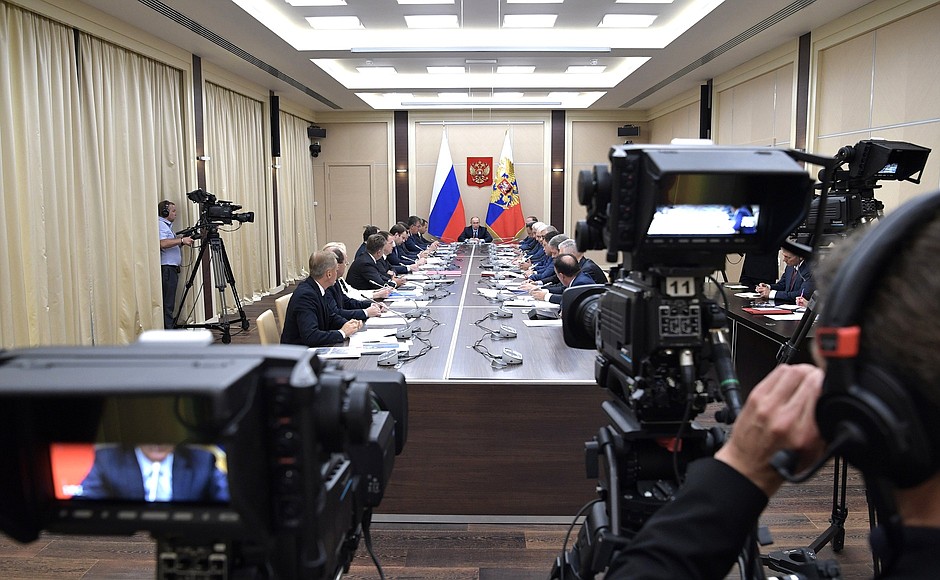President of Russia Vladimir Putin: Good afternoon, colleagues.
Today we will discuss measures to increase the export potential of our agricultural produce, agriculture in general, and will cover several other issues related to this industry.
But first, we have some good news to hear. As far as I understand, despite the re-opening of certain tourist destinations that were closed last year, the statistics for our domestic resorts, including those on the Black Sea and in Crimea, are quite optimistic. I would like to ask Mr Safonov [Head of the Federal Agency for Tourism], to tell us more about this.
Head of the Federal Agency for Tourism Oleg Safonov: Mr President, colleagues,
The high tourist season in Crimea has been quite successful. The peninsula has maintained its status as one of the most popular domestic destinations. Despite the seriously high competition and unfavourable weather conditions (June was rather cold), the number of holidaymakers in Crimea is currently at the same level as in the previous record-breaking summer, or over 2,300,000 people (the 4.8-percent decrease is insignificant and can be written off as statistical error). Many tourists from neighbouring Ukraine are coming to the peninsula although, unfortunately, sometimes there are problems caused by the Ukrainian side.
The number of resorts and spas in Crimea has gone up by 24 percent, that is, last year there were 482 spa centres and now there are 597. Their occupancy remains at last year’s level.
We continue working to make vacationing in Crimea a more accessible and better experience. The average cost of a spa holiday this summer is 3,064 rubles per day, which includes accommodation and full treatment. The average hotel stay is 3,200 rubles which is also quite affordable.
Since July, tourists can purchase a Crimea and Sevastopol visitor’s card. This is an innovative product that allows tourists to visit more than 200 museums and, most importantly, get good discounts on other museums, meals and accommodation. The visitor’s card can significantly reduce the cost of a holiday in Crimea, sometimes by 30 percent.
This summer, there are more independent travellers in Crimea. Forty-seven percent of the tourists arranged their travel themselves while 30 percent booked through travel agencies. Crimea is also a very popular place for family holidays. Forty-four percent of the tourists are families. And, most importantly, our polls show that 85 percent enjoyed their holiday, had a good stay and are willing to come back. Thirty-five percent of these people were visiting Crimea for the first time.
Vladimir Putin: Fine. Thank you.
My second question is somewhat related and concerns road safety. In the past five years, the number of road accidents has significantly dropped, by around 25 percent. However, the number of fatal accidents remains high, around 20,000, if I am not mistaken.
Mr Kolokoltsev, can you comment?
Interior Minister Vladimir Kolokoltsev: Mr President,
It is gratifying to see the positive road safety dynamics continue this year. I can add that this year, the number of deaths has gone down by 10 percent while the overall decrease between 2012 and 2016 was 27 percent. This represents 7,000 lives saved.
We continue to implement all the planned road safety measures and the bar we set for lowering the statistics based on your executive orders is very high. We will keep this bar high. All the required resources are there and, of course, we expect that our actions in the area of road safety will be complemented by the measures of the Transport Ministry and other agencies involved. It is true that a great deal of road fatalities are caused by the condition of roads. The number of fatal accidents is much lower on roads that have dividers, where one cannot use the oncoming lane.
Vladimir Putin: We will say a few words about road quality, as it is one of the main issues. However, we also need to be tougher on reckless drivers. Most severe accidents occur on intercity and inter-regional motorways due to speeding and driving in the oncoming lane. These are the two main reasons. Another reason is alcohol, driving under the influence. These violations must be punished more aggressively but within the scope of current regulations and law.
As far as road quality is concerned, there have been improvements lately. Road illumination has increased three times since the 2000s. However, it is not only the lighting but the surface quality that matters. I know that the Transport Ministry plans to expand road works.
Mr Sokolov, you have the floor.
Minster of Transport Maxim Sokolov: Thank you.
Mr President,
Indeed repairs are to be made on federal motorways this year, and work is already underway on over 8,500 kilometres of the federal motorways.
Installing barrier guardrails of various types has been an emphasis. The coverage area is now about 40 percent, that is, there are 20,000 kilometres of guardrails on the federal motorways. The accident analysis confirms Mr Kolokoltsev’s statement that the number of collisions there dropped by up to 90 percent compared to last year.
As to lighting, 7,500 kilometres of federal motorways have lighting, and we continue the work. There is particular focus on pedestrian safety. As of today, federal motorways have 161 surface pedestrian crossings and 62 underpasses. Of course, over 260 crossings have traffic lights and appropriate lighting. By 2020, an additional 400 pedestrian crossings, both surface, underpasses and overpasses, are to be commissioned.
We pay special attention to the legislative framework. Per the instructions that you, Mr President, gave at the State Council meeting in Yaroslavl on road safety, the Ministry of Transport has submitted draft laws to the Government to introduce the concept of road safety auditing, extend the statute of limitations for administrative proceedings, and keep records of revenues from traffic violation fines in the regional road funds and allocate equivalent amounts for road safety issues.
The Safe and Quality Roads project has been launched this year. It is being implemented in 39 major cities and urban conglomerations of our country. Thanks to it, over 4,000 kilometres of roads in the largest urban conglomerations will meet safety standards by the end of this year. Within two years, at least half of the city road networks will be up to standards in metropolitan areas.
This year, we plan to eliminate 1,010 sites of frequent road accidents. Next year the plan is to eliminate another 713 road hazards. Within two years, we will have reduced the number of sites of frequent accidents in major cities by 65 percent, which will make a tangible contribution to higher road safety.
Vladimir Putin: Very good. Statistics are good but it is also important to ensure good quality.
Maxim Sokolov: Yes sir. We will focus on that in particular.
Vladimir Putin: Fine.
Mr Novak, we recently discussed the agreements you reached and your meetings with your counterparts from OPEC countries. You told me about it. This is an important matter, so please bring our colleagues here up to date.
Alexander Novak: Mr President, Mr Prime Minister, colleagues,
Let me remind you that on December 10, 2016, the OPEC and non-OPEC states signed the Declaration of Cooperation in Vienna. Twenty-four countries committed to reducing oil production by 1.8 million barrels per day for six months. In late May, the Declaration was extended by another nine months. The Joint Ministerial Monitoring Committee consisting of ministers of six OPEC and non-OPEC countries had its fourth meeting this week. For the first time, the meeting took place in St Petersburg, Russia, which truly stresses the importance of our country to the global oil market.
We summarised the results of the first six months since the Declaration came into effect. The countries have achieved 98 percent conformity, which is the highest level in the history of OPEC. This is unparalleled conformity for agreements at this level. The OPEC and non-OPEC countries noted the significant progress made towards achieving the goals set by the Declaration.
Since the beginning of 2017, we have recorded a significant recovery of the oil market. The joint action has resulted in an inventory drawdown of more than 350 million barrels. Otherwise, the excess oil inventory would have almost doubled compared to the level before this deal. However, this negative scenario did not come to pass, and instead the excess stock declined during the first half of 2017. The overhang of commercial oil stock over the 5-year average has decreased by almost 25 percent in the past six months, from 340 million to 250 million barrels. We expect this trend to accelerate in the third quarter of 2017 due to seasonal factors.
We also noted that for the first time in three years the investment appeal of the oil sector is improving. Between 2014 and 2016, investment fell by $1 trillion while in 2017 investment has been increasing. We also see that market volatility has been lower and it should be noted that Brent oil prices were 30 percent higher in the first half of 2017 than in the first half 2016, or $52.8 against $41 last year. This factored significantly in the budget revenue growth and the trade balance.
Speaking of further forecasts of market stabilisation, we also expect a positive trend in the second half of 2017 in the context of the general forecast of global economic growth of 3.1 percent to 3.4 percent, and the growing demand for oil in China and India. Overall, we expect the market rebalancing to speed up.
Secondly, the meeting looked at both the overall conformity of all the 24 states and each country in particular. Russia is fully compliant with its obligations. We adjusted our production downwards by 300,000 barrels by the end of April. We are currently maintaining this level and confirmed our commitment to stabilise oil markets.
Mr President, we will continue to monitor the situation and take all necessary measures with our partners in order to rebalance the market in line with our agreements.
Thank you.
Vladimir Putin: Thank you.
Colleagues,
As you know, yesterday at the invitation of the Finnish President I visited Finland, our neighbour, where the Bolshoi Theatre is currently touring. The tour is very successful, as we saw for ourselves; and the performers have been very well-received by the public.
Mr Medinsky, what about Russian theatres' touring activities on the whole? How do you see the situation?
Culture Minister Vladimir Medinsky: Mr President,
Yesterday, you attended a performance of the Bolshoi Theatre opera company's tour in Finland. At the same time, the Mariinsky Theatre is touring London, while the Bolshoi Theatre's ballet company is in New York City. This summer, our drama theatres are performing all over the world, especially in Japan. I would like to present you with an album of photographs taken at the official start of Russian Seasons, which was opened by Prime Minister Shinzo Abe this year.
However, I believe the main thing is that we are witnessing an actual theatrical, touring and philharmonic boom. Suffice it to say, last year theatre attendance in Russia exceeded 38 million people, an absolute record since 1991. By the way, the absolute cinema attendance record since 1991 was set as well.
The Moscow Philharmonic, which specialises in classical music, has broken its own record for the second consecutive year, a classical music season ticket record that made it into the Guinness World Book of Records.
We are most pleased in this regard that the extrabudgetary revenues of our theatres are growing. Here are the figures: in the past five years, extrabudgetary revenues of theatres in the country have grown by 69 percent, and those of federal theatres by 105 percent – that is practically 20-percent growth each year. Even greater growth in revenue has been registered by federal museums – 125 percent over the past five years. This reflects the flexible pricing policy and steady increase in attendance.
We are making efforts to support the most successful cultural institutions in their touring activities and in general. For instance, five years ago the Vakhtangov Theatre had two stages, while this year we will open the fifth and sixth stages, all at one venue on Arbat Street. This is going to be a theatre complex.
This year saw a breakthrough in new forms of government support for theatres. Let me give you some examples. Thanks to your instructions given at the Popular Front forum, grants to theatre and concert organisations have been adjusted, which met with a huge positive response, and everyone involved in culture at the professional level sincerely appreciates your efforts.
Moreover, the list of grantees was expanded by including recipients from remote areas, from the North and Siberia, such as the Perm Opera and Ballet theatre, the Russian Folk Choir from Archangelsk, totalling 15 ensembles.
Last April the Prime Minister made a decision on regular support for children’s and puppet theatres. For the first time ever, children’s puppet theatres will tour the whole country. State support will be provided to 78 regions this year, and children’s theatres will tour 57 of them. A large-scale touring programme, which we launched following instructions from you and the Executive Office in 2014 (it dealt with metropolitan theatres touring remote regions of Russia), will yield the following results this year: 350,000 tickets booked and 700 performances. This is four times as much as two years ago, while the amount of money we spend on government support remains the same.
The growth, Mr President, is due to the fact that the programme is being joined by sponsors, businesses, regional and municipal authorities. Apart from that, starting this year, municipal theatres in cities with populations under 300,000 will get support, probably for the first time since the Soviet era. We will annually allocate 670 million roubles on new shows in 149 municipal theatres in 56 regions.
All these steps testify to the great attention paid by the state to the theatres. I would like to take the opportunity, Mr President, and extend an invitation from theatre professionals to you. A contest of young theatre directors will take place this November. These are young directors, future artistic directors of our theatres; they are a new generation growing up to take the lead. The finals of the contest will be held at the Vakhtangov Theatre on November 10. We would be happy to see you during the conclusion of that festival.
Thank you very much.
Vladimir Putin: Thank you very much. Thank you for the invitation and for the information.
<…>
